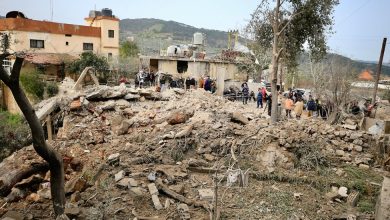Anti-U.N. Protests in Congo Leave 15 Dead, Including 3 Peacekeepers

KINSHASA, Democratic Republic of Congo — At least 15 people, including three U.N. peacekeepers, have been killed and 60 others injured in the east of the Democratic Republic of Congo in an escalation of dayslong protests against the United Nations in a mineral-rich region that has been ravaged by incessant deadly violence.
Two Indian police officers and one Moroccan military member were killed on Tuesday when protesters breached the United Nations compound in Butembo, a city in the province of North Kivu, Farhan Haq, deputy spokesman for the global organization, said at a briefing in New York. An Egyptian police officer was also injured, Mr. Haq added.
“Violent attackers snatched weapons from Congolese police and fired upon our uniformed personnel,” Mr. Haq said in the briefing on Tuesday, adding that “hundreds of assailants” had also targeted other U.N. bases in North Kivu by “throwing stones and petrol bombs, breaking into bases, looting and vandalizing and setting facilities on fire.”
Their actions, he said, were “fueled by hostile remarks and threats made by individuals and groups against the U.N., particularly on social media.”
The Congolese government expressed regret over the deaths on Tuesday and called for calm from the population in the region. “Nothing can justify any form of violence,” Patrick Muyaya, a government spokesman, said at a news conference in Congo’s capital, Kinshasa.
Mr. Muyaya also said that the authorities would carry out an investigation into the attacks.
Demonstrators had blamed the United Nations for the killing of protesters, but Khassim Diagne, the acting head of the U.N. peacekeeping mission in the country, told reporters that peacekeeping forces had not fired at those who breached their bases.
Mr. Haq also said that the global body’s forces had been “advised to exercise maximum restraint, using tear gas to disperse protesters and only firing warning shots when U.N. personnel or property are under attack.”
Mr. Haq said that Secretary General António Guterres underscored that any attacks against the peacekeepers “may constitute a war crime.”
Demonstrations began on Monday in front of the United Nations base in Goma, the capital of North Kivu, and then spread to other towns in the province, including Butembo, with protesters demanding the departure of the peacekeeping forces, claiming that they had failed to protect civilians. That sentiment has been gathering pace in recent weeks, with some government officials and youth groups accusing U.N. forces of being unable to stop a surge of rebel attacks that have left hundreds dead or injured and communities displaced and in dire need of humanitarian aid.
During a trip to eastern Congo this month, the president of the Congolese Senate, Modeste Bahati Lukwebo, demanded the departure of the U.N. forces. “They must pack up,” he said, adding, “We ourselves will ensure peace, security and territorial integrity.”
The dissatisfaction was underlined by Lucha, a Congolese civil society group, which said in a statement that the United Nations had failed to protect the public despite significant diplomatic, logistical and financial backing.
Lush and rich in minerals, Congo’s eastern regions have faced devastation for decades from more than 120 militant groups operating in the provinces of North Kivu, South Kivu and Ituri, according to the Kivu Security Tracker, which documents violence and abuses in the region.
In November, Congo and Uganda began a joint operation against the Allied Democratic Forces, one of the deadlier rebel groups in the region that has even carried out attacks in the Ugandan capital, Kampala. In February, the authorities accused another militia, the Cooperative for Development of Congo, of massacring about 60 people, including children, as they slept in a makeshift camp.
Violence also flared in mid-June when another rebel group, known as M23, carried out a spate of attacks in which dozens of people were killed and at least 25,000 others were displaced. Congo has accused Rwanda of backing the group, leading the Congolese president, Félix Tshisekedi, to suspend bilateral agreements with the neighboring country.
Many Congolese have questioned the effectiveness of the United Nations peacekeeping forces, who have been stationed in the country in one form or another since 1999.
Officially known as the United Nations Organization Stabilization Mission in the Democratic Republic of Congo, the current mission was mandated in 2010 by the Security Council to help safeguard civilians, deter armed groups and work closely with the government in peace efforts.
Subrahmanyam Jaishankar, India’s foreign minister, posted on social media on Tuesday that he was “deeply grieved” by the loss of the two Indian peacekeepers. He said the perpetrators should be brought to justice.
Hishammuddin Hussein, Malaysia’s defense minister, said in a post on Wednesday that three Malaysian armed forces personnel with the mission had been evacuated.
“For their security, their location will not be disclosed,” he said.
Steve Wembi reported from Kinshasa, and Abdi Latif Dahir from Nairobi, Kenya.





